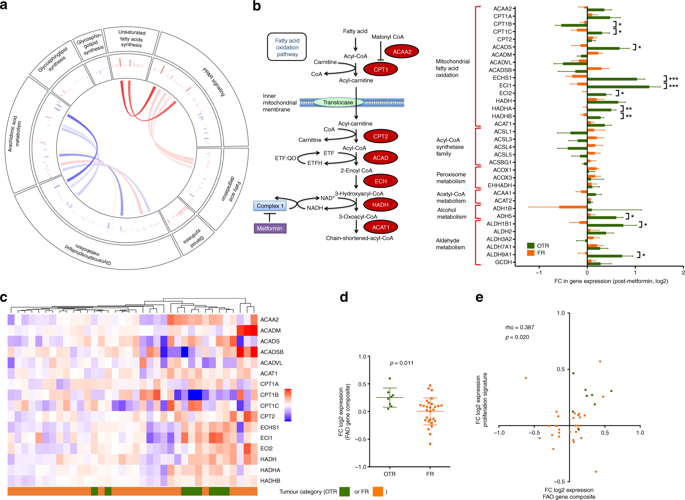当前位置:
X-MOL 学术
›
Br. J. Cancer
›
论文详情
Our official English website, www.x-mol.net, welcomes your feedback! (Note: you will need to create a separate account there.)
Transcriptomic analysis of human primary breast cancer identifies fatty acid oxidation as a target for metformin.
British Journal of Cancer ( IF 8.8 ) Pub Date : 2019-12-10 , DOI: 10.1038/s41416-019-0665-5 Simon R Lord 1, 2, 3 , Jennifer M Collins 4 , Wei-Chen Cheng 1 , Syed Haider 5 , Simon Wigfield 2 , Edoardo Gaude 6 , Barbara A Fielding 4, 7 , Katherine E Pinnick 4 , Ulrike Harjes 2 , Ashvina Segaran 1 , Pooja Jha 8 , Gerald Hoefler 8 , Michael N Pollak 9 , Alastair M Thompson 10 , Pankaj G Roy 11 , Ruth English 12 , Rosie F Adams 12 , Christian Frezza 6 , Francesca M Buffa 1 , Fredrik Karpe 3, 4 , Adrian L Harris 1, 2, 3
British Journal of Cancer ( IF 8.8 ) Pub Date : 2019-12-10 , DOI: 10.1038/s41416-019-0665-5 Simon R Lord 1, 2, 3 , Jennifer M Collins 4 , Wei-Chen Cheng 1 , Syed Haider 5 , Simon Wigfield 2 , Edoardo Gaude 6 , Barbara A Fielding 4, 7 , Katherine E Pinnick 4 , Ulrike Harjes 2 , Ashvina Segaran 1 , Pooja Jha 8 , Gerald Hoefler 8 , Michael N Pollak 9 , Alastair M Thompson 10 , Pankaj G Roy 11 , Ruth English 12 , Rosie F Adams 12 , Christian Frezza 6 , Francesca M Buffa 1 , Fredrik Karpe 3, 4 , Adrian L Harris 1, 2, 3
Affiliation

|
BACKGROUND
Epidemiological studies suggest that metformin may reduce the incidence of cancer in patients with diabetes and multiple late phase clinical trials assessing the potential of repurposing this drug are underway. Transcriptomic profiling of tumour samples is an excellent tool to understand drug bioactivity, identify candidate biomarkers and assess for mechanisms of resistance to therapy.
METHODS
Thirty-six patients with untreated primary breast cancer were recruited to a window study and transcriptomic profiling of tumour samples carried out before and after metformin treatment.
RESULTS
Multiple genes that regulate fatty acid oxidation were upregulated at the transcriptomic level and there was a differential change in expression between two previously identified cohorts of patients with distinct metabolic responses. Increase in expression of a mitochondrial fatty oxidation gene composite signature correlated with change in a proliferation gene signature. In vitro assays showed that, in contrast to previous studies in models of normal cells, metformin reduces fatty acid oxidation with a subsequent accumulation of intracellular triglyceride, independent of AMPK activation.
CONCLUSIONS
We propose that metformin at clinical doses targets fatty acid oxidation in cancer cells with implications for patient selection and drug combinations.
CLINICAL TRIAL REGISTRATION
NCT01266486.
中文翻译:

人类原发性乳腺癌的转录组学分析将脂肪酸氧化确定为二甲双胍的靶标。
背景 流行病学研究表明,二甲双胍可降低糖尿病患者的癌症发病率,目前正在进行多项评估该药物再利用潜力的晚期临床试验。肿瘤样本的转录组分析是了解药物生物活性、识别候选生物标志物和评估治疗耐药机制的绝佳工具。方法 36 名未经治疗的原发性乳腺癌患者被招募到一项窗口研究,并对二甲双胍治疗前后的肿瘤样本进行转录组分析。结果 调节脂肪酸氧化的多个基因在转录组水平上被上调,并且在先前确定的具有不同代谢反应的两组患者之间的表达存在差异变化。线粒体脂肪氧化基因复合特征的表达增加与增殖基因特征的变化相关。体外试验表明,与之前在正常细胞模型中的研究相比,二甲双胍减少了脂肪酸氧化,随后细胞内甘油三酯的积累,与 AMPK 活化无关。结论 我们建议临床剂量的二甲双胍靶向癌细胞中的脂肪酸氧化,这对患者选择和药物组合有影响。临床试验注册 NCT01266486。二甲双胍减少脂肪酸氧化,随后细胞内甘油三酯的积累,与 AMPK 激活无关。结论 我们建议临床剂量的二甲双胍靶向癌细胞中的脂肪酸氧化,这对患者选择和药物组合有影响。临床试验注册 NCT01266486。二甲双胍减少脂肪酸氧化,随后细胞内甘油三酯的积累,与 AMPK 激活无关。结论 我们建议临床剂量的二甲双胍靶向癌细胞中的脂肪酸氧化,这对患者选择和药物组合有影响。临床试验注册 NCT01266486。
更新日期:2019-12-11
中文翻译:

人类原发性乳腺癌的转录组学分析将脂肪酸氧化确定为二甲双胍的靶标。
背景 流行病学研究表明,二甲双胍可降低糖尿病患者的癌症发病率,目前正在进行多项评估该药物再利用潜力的晚期临床试验。肿瘤样本的转录组分析是了解药物生物活性、识别候选生物标志物和评估治疗耐药机制的绝佳工具。方法 36 名未经治疗的原发性乳腺癌患者被招募到一项窗口研究,并对二甲双胍治疗前后的肿瘤样本进行转录组分析。结果 调节脂肪酸氧化的多个基因在转录组水平上被上调,并且在先前确定的具有不同代谢反应的两组患者之间的表达存在差异变化。线粒体脂肪氧化基因复合特征的表达增加与增殖基因特征的变化相关。体外试验表明,与之前在正常细胞模型中的研究相比,二甲双胍减少了脂肪酸氧化,随后细胞内甘油三酯的积累,与 AMPK 活化无关。结论 我们建议临床剂量的二甲双胍靶向癌细胞中的脂肪酸氧化,这对患者选择和药物组合有影响。临床试验注册 NCT01266486。二甲双胍减少脂肪酸氧化,随后细胞内甘油三酯的积累,与 AMPK 激活无关。结论 我们建议临床剂量的二甲双胍靶向癌细胞中的脂肪酸氧化,这对患者选择和药物组合有影响。临床试验注册 NCT01266486。二甲双胍减少脂肪酸氧化,随后细胞内甘油三酯的积累,与 AMPK 激活无关。结论 我们建议临床剂量的二甲双胍靶向癌细胞中的脂肪酸氧化,这对患者选择和药物组合有影响。临床试验注册 NCT01266486。


























 京公网安备 11010802027423号
京公网安备 11010802027423号